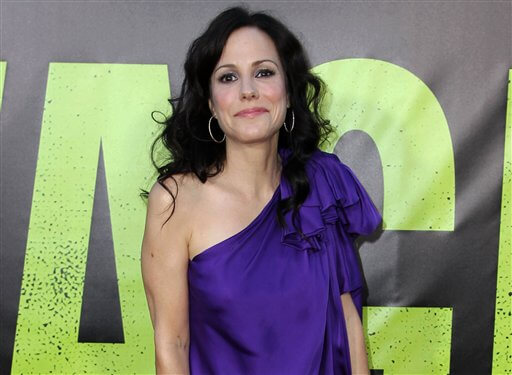
Even after eight years of “Weeds,” the marijuana jokes keep on coming.
Fake joints were handed out at a news conference promoting the series, which concludes the adventures of a drug-dealing suburban widow with Sunday’s hour-long finale (10 p.m. EDT).
“I used to say that pot took away from my rent, and now it pays it,” wisecracked cast member Justin Kirk.
But for Jenji Kohan, creator and executive producer, the legacy of the show starring Mary-Louise Parker is far more substantive than one-liners.
“We had an extraordinary opportunity to do a half-hour where you didn’t have to have a joke a page …. We got to do drama slammed right up against comedy, at will,” Kohan said. “We sort of piloted a new half-hour form and that was a lovely thing to be able to do.”
The approach didn’t benefit the show in the awards realm, where hybrids tend to sow confusion. “Weeds” received a handful of Emmy nods, including for Parker, co-star Elizabeth Perkins and as best comedy, but no major awards, although Parker was a Golden Globes winner.
“Weeds” certainly was a champion groundbreaker for Showtime, which became home to other series with a similarly dark bent.
It was “the show that set the tone for the current slate of original programming on Showtime,” said David Nevins, the channel’s entertainment president. “It redefined the network and paved the way for a new generation of antiheroes” on “Nurse Jackie,” ”Dexter,” ”Californication” and more.
It’s also among a rare group of cable TV shows that reached 100 episodes, Nevins said at a celebration of the milestone taping.
Doe-eyed troublemaker Nancy Botwin (Parker) is at a critical juncture in the finale.
In the preceding episode, she and brother-in-law Andy (Kirk) and son Silas (Hunter Parrish) returned home to fictional Agrestic, Calif., and to familiar faces. Nancy, Guillermo (Guillermo Diaz) and Conrad (Romany Malco) have teamed up to grow legalized marijuana, and Nancy had an emotional tryst with Andy.
Parker has her character’s number, she told reporters in July.
“Generally, as a culture, we’ve tended to gravitate more towards women who are more, you know, exemplary in a way than she is,” she said. “But I like that about (her). And I always wanted her to be bad. I wanted her to be as bad as she could and worse than that.”
Nancy’s appeal lies in her determination, Parker said: “Her heart’s usually in the right place, and she just can’t be defeated, and she keeps trying.”
Kohan, who describes herself as “wistful” about the show’s conclusion, is moving on to several other projects, including a Netflix prison-set series, “Orange is the New Black,” based on the book of the same name by Piper Kerman.
How will viewers react to the “Weeds” finale?
“I hope they’ll feel a sense of satisfaction. I hope they’ll appreciate where everyone ended,” Kohan said.
The final chapter for Nancy and her circle is fitting, according to Parker.
“I would hate to give away anything about it, but I just cried when I read it. I think it’s beautiful,” she said. The episode has “hope in it, and there was some sort of benediction.”
___
Online:
http://www.sho.com
Copyright 2012 The Associated Press.



































